R Madhavan plays rocket scientist Nambi Narayanan in Rocketry: The Nambi Effect and makes you root for his character from the word go. His Nambi is a god-fearing man as much at home doing rituals as he is tinkering with rockets. You see him being beaten black and blue by the police over a trumped -up charge and you feel the blows. He’s socially tarred and feathered over accusations of being a Pakistani spy, and his anguish is palpable. After regaling audiences in front of the camera for more than two decades, Maddy, as Madhavan is fondly known, took the plunge to turn director with Rocketry. It wouldn’t have been easy to bring the disgraced scientist’s story to life. What’s more remarkable is that Madhavan chose to essay the title role himself. Wearing both the director and the lead actor’s cap wouldn’t have been an easy burden. The dimples in his smile have deepened, never mind the extra amount of grey on his temples. Excerpts from an interview with the talented actor-turned-filmmaker.
What is it about the story of Nambi Narayanan that made you want to begin your directorial journey with it?
Somebody told me there is an amazing story about a good-looking rocket scientist from ISRO who had an affair with a Maldivian woman. They both had a roaring affair and they sold the secrets of Indian rocketry to Pakistan. Therefore, he was put in jail, tortured, and almost killed. Then the CBI investigation proved him innocent. I think the day I met him was the day my life changed completely. Madhavan before meeting Nambi Narayanan and Madhavan after meeting Nambi Narayanan are two different people. He had an aura of angst, anger, and sadness that I have never seen in any human being before. He was angry. His lips were quivering when he was talking, and he was like, “How can they call me a traitor? How the hell can they put a case like this on me?” I said, “All right, sir, you’ve been vindicated,” he says, “But what do you mean vindicated? Just go to Wikipedia, go to Google, put in my name, and see what comes up.” And sure enough, if you put in Nambi Narayanan ISRO, a spy case comes up. He said that nobody wanted to get married to his family, and he was not able to get his daughter married. For what? He asked who was going to change that narrative? And when I met him, he hadn’t been given compensation. This was in 2016. So I got carried away by his talk, and he was telling me about the futility of the case, the stupidity of it, and how he had never met the woman. It took me seven months to write that script. But that wasn’t the final script, mind you…
Go on…
After seven months, when I came to give him the script, he said he was happy but he said there were some things missing. “I was not in India. I did my instability theorem in Princeton under Crocco.” Being a science student, I was stunned. I said, “What do you mean, Crocco?” Are you talking about Professor Luigi Crocco?” He was like, “Yes.” Professor Luigi Crocco is considered the father of the moon mission. I asked, “What’s your connection with him?” He said, “I did my thesis under him in 10 months.” And Crocco’s students are known to have taken eight-nine years to finish their thesis. Then he started talking about Princeton, France, Scotland, and the USSR. How he and his team spied on the French scientists, how they smuggled engine parts out of Russia. And I was like, “Are you serious? Why didn’t you tell me about it earlier? He said, “What is there to say? They paid me my salary. I did my job.” It struck me that nobody knows about Dr. Nambi Narayanan and all that he has done. I said, “I am not making your story just on your case. I think it is a national disservice not to know who Nambi Narayanan is and not to know what he has achieved.”That’s why I made the movie.
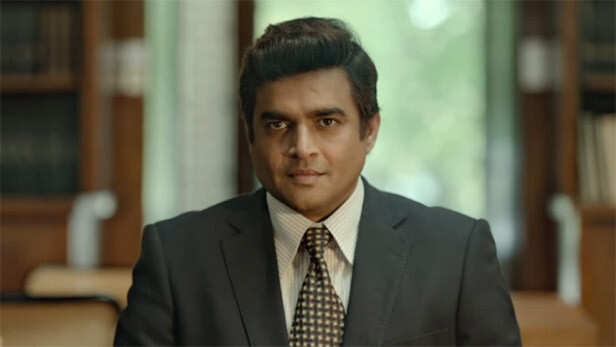
Why did you choose to write the film yourself?
I wrote it because I knew his story and I thought I was technically qualified to understand. The reason he got the Padma Bhushan was for the Vikas Engine, which got the distinction of never having failed. The mission might have failed, the satellites might have failed, but Nambi Narayanan’s engine has never failed. It is a record-breaking, iconic engine that nobody is talking about except outside India. People have been keeping an eye on him, and people have been trying to kill him, but he has managed to survive because he does not have any interest except in rocketry. Despite this, they managed to get him in this false case, and they tried to kill him there, but he survived. How do you show the quality of a rocket scientist? I had to make sure that I didn’t dumb it down. I understood what the beauty of the engine was and wrote it without dumbing it down. It is technically totally accurate.
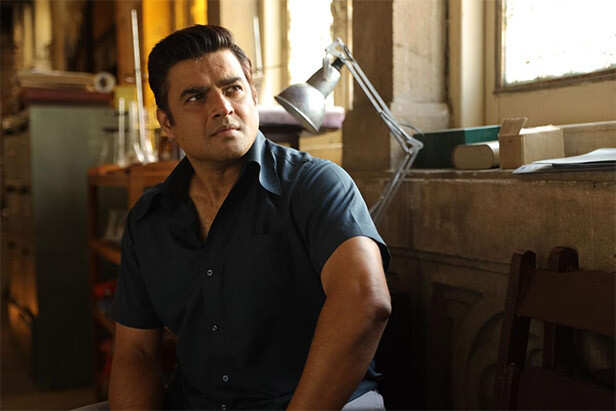
Then you choose to direct and produce it as well…
No producer wanted to touch it as it didn’t have songs, dances or any other masala, so I decided to produce it as well. I don’t know what direction is all about and I have never directed in my entire life. I have never been to an editing room in my life, I have never gone to music sessions, I don’t know how to talk to an art director or an action director. Main set pe jaata tha, dekhta tha, aaj shooting kya hai, kiske saath gaana hai, kisko chumma dena hai, kya karna hai batao, mera cheque do, phir release ke time thoda stress hone ka natak karo, that’s it. (I used to go on the sets and ask what I had to do. I did what my director told me and then took my cheque and left. And then pretended to be anxious during the time of release, that’s all I knew) Nambi sir said, “you look like me, you walk like me, you should direct it.” So, in a moment of bravado, I said yes.
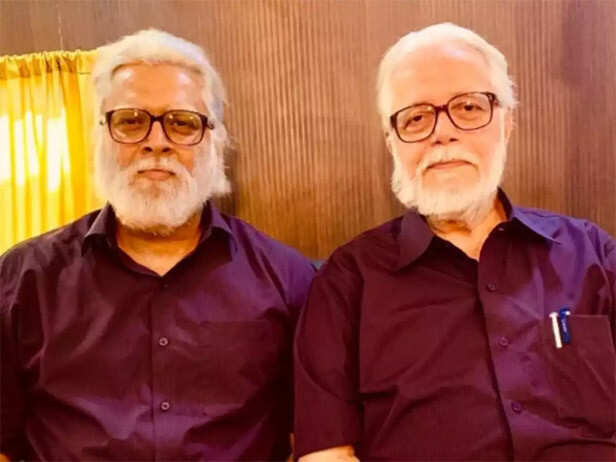
Directing, producing, co-writing, and starring – how did you manage to don so many hats for Rocketry?
The shooting in three languages, showing the passage of 50 years without prosthetics, shooting in over eight countries, showing the rocket engines, breaking my jaw and having my teeth realigned to look like Nambi — all that was just stupidity. I think it is maniacal if not insanity. Once we met Dr. Nambi Narayanan and saw the angst in his eyes and the injustice that he was facing, it just became a sort of insanity for all of us; we just had to do it. And somehow, the challenges did not seem like challenges. This was the conviction that the film gave us through all time.
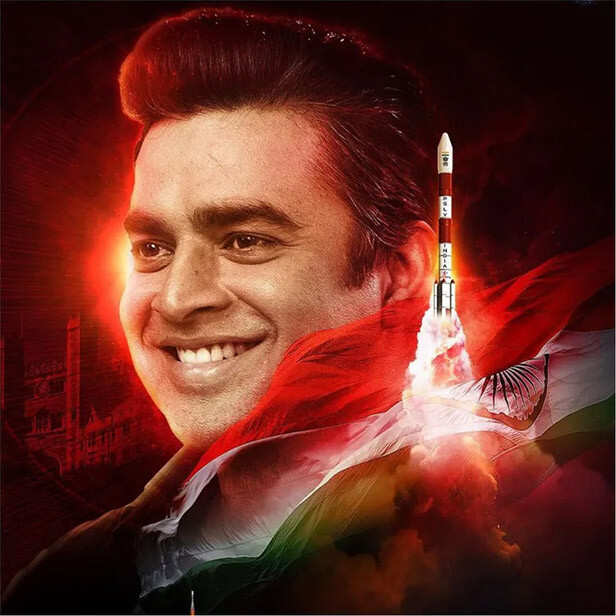
What challenges did you face while preparing for your role?
I would say we redefined character building and character association with films. For example, while doing my teeth transformation, I realised a lot of important things about how teeth play a vital part in showing the age of a person. Sometimes may be much younger than you look, but because your teeth are not lining up correctly, you may look older. So I figured out how to look younger with just the help of my teeth. How to look younger by keeping your hair right. Why do you even apply oil to your hair? I sat on a chair for 14 hours to get my hair just like Nambi’s and my wife thought that I was going to be completely bald. I have realised that whatever risks you want to take, if they are supported by proper research and planning, you mitigate the risks and you have a lot to learn from that.
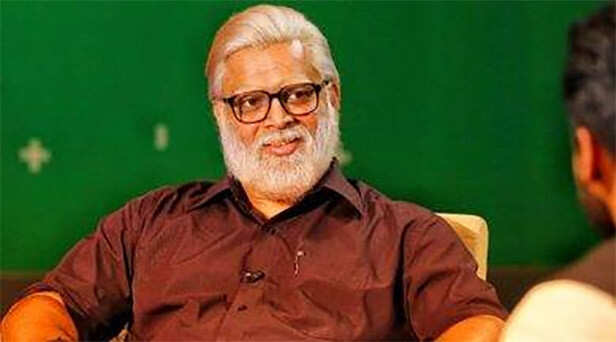
Having your directorial debut film premiere at Cannes is no small feat…
Honestly, my friend and I were nervous because I don’t know what made me do what we did. But finally, the verdict was going to be passed by a very discerning audience. And Cannes is no playground, people are not going to come and pat my back because I directed for the first time. The fact that they stayed and clapped was a confirmation that I had not screwed up. I think all the clapping was for the respect and awe they had for Nambi Narayanan.
You wanted to release it only in theatres—is the medium really important?
We waited till this could be released in the theatres, even though we could’ve done it over OTT, because we believed that we had to tell Dr. Nambi Narayanan’s story over a large canvas. Indians and their ability to overcome obstacles and challenges and the uniqueness of who we are as a nation and as a society has always fascinated me. The stories appeal to me because it shows human excellence at its best and that’s what I like.
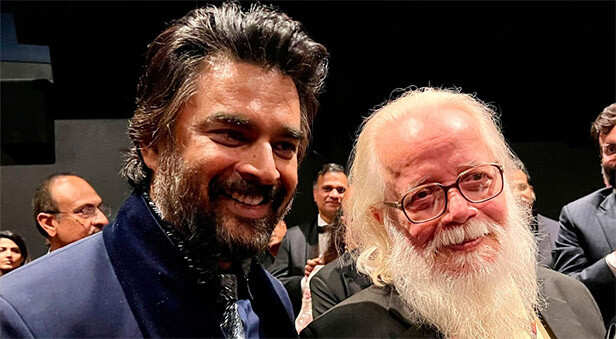
How did Shah Rukh Khan come to be a part of your film?
I had talked to him about this story when I was shooting Zero with him, and he had remembered it. When we met him for his birthday, he said that he remembered the story and wanted to be a part of it. “Make me do a passing role in the background,” he said. I thought he was just being kind, so I said thank you, and he was like, “No, no, I am serious.I want to do a role in the movie.” He was serious. His manager said he wanted to know when the dates were. I said, “I’m not going to give a passing role in the background to Shah Rukh Khan, I have a role which is quite substantial.” and he just asked me, “How many days do you require?” And that’s it. Shah Rukh Khan came and he actedin my film and he did not take money for anything, not for his staff, not for his costumes or the caravans. I thought he had done it for the love of R.Madhavan, but when he met Dr. Nambi Narayanan, the awe and respect he showed, I highly suspect it had to do with him as well.



















.png)

Discussion about this post